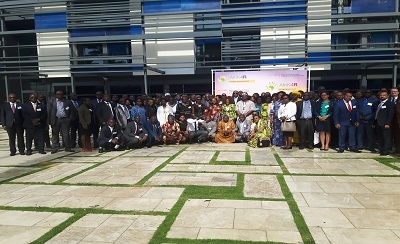
On January 20, 2017, the Eighth Annual Meeting of the African Community of Practice on Managing for Development Results (AfCoP-MfDR) kicked off in Dakar, Senegal. Officially launched by His Honorable, the Minister in charge of the Plan for an Emerging Senegal, the Annual Meeting 2017 of AfCoP is critically important for the community as discussions focused on the impact of AfCoP so far and the mechanisms to be developed to ensure its sustainability. In 2007, African practitioners decided to establish a community of practice that would advance and mainstream MfDR in Africa’s development at all levels. Since 2012, ACBF has been providing essential support to AfCoP through its “Africa for Results” (AfriK4R) flagship program. 2017 is an important year for AfCoP as it marks simultaneously 10 years of its existence and the closing of the AfriK4R program that is providing critical support to the community of practice.
This meeting was an opportunity for ACBF to present the progress made so far on AfCoP in terms of knowledge sharing. From 2012 to 2016, 50 online discussions were organized around key development topics to facilitate knowledge exchange and promote learning among participants. On the other hand, more than 150 knowledge products including case studies, knowledge briefs and guides and tools were produced and disseminated to showcase MfDR good practices on the continent and provide the necessary guidelines for AfCoP members to perform various tasks that will help them to achieve more results. Today, universities, governments, civil society organizations and private sector are actively utilizing AfCoP knowledge products. Moreover, ACBF and AfDB have collaborated to organize three editions of the “Africa for Results Forum”, a unique continental event that brings together practitioners and leaders to discuss and exchange on how Managing for Development Results can be instrumental in advancing key development issues like natural resource management (AfriK4R Forum 2013), regional integration (AfriK4R Forum 2015) and domestic resource mobilization (AfriK4R Forum 2016).
The key outcomes include the establishment of a legal and strategic framework. A draft Constitution has been adopted and will support the transition of AfCoP to a stand-alone fully fledged institution. Furthermore, a strategic framework has been agreed upon – vision, mission, guiding principles and objectives – that will support the development of a Strategic plan. Furthermore, this Annual Meeting enabled the election of new members for AfCoP Executive Committee. The new members are: Lamine N’Dongo (President), Richard Ssewakiryanga, (Vice-President) and Nigest Haile (Treasurer). This Executive Committee will be joined by representatives from AfCoP countries, Regional Economic Communities and thematic groups to form the AfCoP Council.
On behalf of Prof. Emmanuel Nnadozie, Executive Secretary of ACBF, Dr. Thomas Munthali, Director of Knowledge and Learning Department, reaffirmed the support of ACBF to AfCoP especially in ensuring that the transition to a stand-alone institution is smoothly done and strong foundations are put in place.





